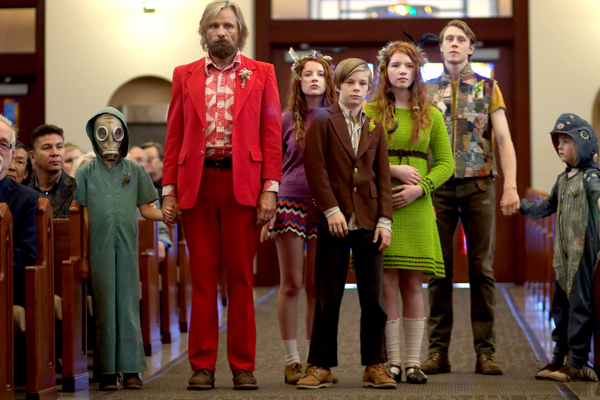Movie review by Greg Carlson
Filmmaker Matt Ross’s “Captain Fantastic” pursues a multifaceted thematic agenda as it explores the unorthodox off-the-grid lifestyle of a politically energized father of six played to prickly perfection by Viggo Mortensen. Despite the film’s “power to the people, stick it to the man” refrain, Ross accomplishes his most satisfying returns by examining the universally recognizable toll of grief on a nuclear family. While some key moments test the limits of believability, Ross labors to construct this universe with care and respect (arguably too much of the latter for Mortensen’s Ben Cash). Given the ubiquity of dystopian tales on cinema screens, it is refreshing to encounter a thoughtfully considered tale that wonders whether utopia is still within reach.
Cash’s progeny, introduced in a feral, rite-of-passage forest hunt, range in age from roughly seven to eighteen. Frustrated and confused by the absence of their hospitalized mother Leslie (Trin Miller), the children follow a grueling schedule of intense exercise, survival training, and intellectual and philosophical study overseen by Ben. Eldest son Bodevan (George MacKay), who secretly plots to leave the compound for college, is the most fully defined of the sextet. Even though we don’t get to know daughters Kielyr and Vespyr (Samantha Isler and Annalise Basso) quite as well, Ross can be commended for fairly consistently delineating the specific personalities of the brood.
Initially, Ross lays out a challenging binary pitting Ben’s leftist idealism against the man’s physically dangerous and emotionally cultish dominance over his flesh and blood. To a certain extent, the question of whether Ben’s way of life has helped or hindered his offspring continues throughout the film as one of Ross’s going concerns. In one scene, Ben defends his educational methodologies by exposing the ignorance of his rude, screen-addicted nephews. In another, Bodevan reveals a shocking naiveté in matters of courtship and romance. Parallel to the trusty road trip framework, Ross uses these fish-out-of-water culture clashes as a way to drive forward the action and feed conflict.
Mortensen’s charisma and Ross’s admiration for Ben make it difficult to question the extent to which the man may be stunting and even harming his kids. In one scene that recalls a similar ruse in Gus Van Sant’s “Drugstore Cowboy,” Ben stages a distraction to “liberate” supplies from a supermarket. Later, father-in-law Jack (Frank Langella) calls out Ben for the crime, but as far as Ross is concerned, Ben is saintly and even at times heroic. A more complex, nuanced portrait of Ben, especially in the last third of the film, lays just out of reach.
With a running time of nearly two hours, “Captain Fantastic” might have benefited from a haircut, particularly given the protracted final section and a series of false conclusions (even if Ross ultimately lands a terrific closing shot). While critic Keith Watson identifies “about five different feel-good endings,” he takes special umbrage at the curious choice of “Sweet Child o’ Mine” — performed diegetically by the characters — during the movie’s emotional climax. Questioning the likelihood of the Guns N’ Roses hit given the family’s fierce anti-corporate belief system and previously documented pop culture illiteracy, Watson argues that the “moment is calculated for maximum emotional punch.” While that particular critique is certainly true, an alternative reading suggests that the song was loved by Leslie, a touch that would be in keeping with other evidence of the matriarch’s softer attitudes about the world left behind.
